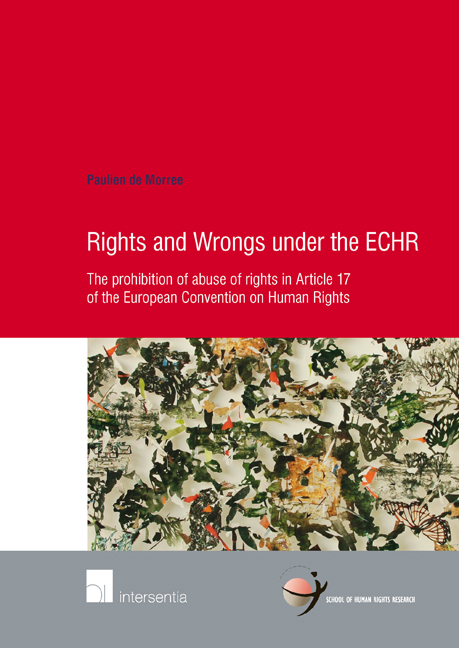 Rights and Wrongs under the ECHR
Rights and Wrongs under the ECHR Book contents
- Frontmatter
- Acknowledgements
- Contents
- List of Abbreviations
- Chapter 1 Introduction
- Chapter 2 The Creation of the European Convention on Human Rights
- Chapter 3 The Strasbourg Case Law on Article 17 ECHR
- Chapter 4 The Interpretation of Article 17 Echr in Legal Doctrine
- Chapter 5 Other Abuse Clauses in Human Rights Law
- Chapter 6 The Concept of Abuse of Rights
- Chapter 7 The Concept of Militant Democracy
- Chapter 8 The German ‘Wehrhafte Demokratie’
- Chapter 9 Militant Democracy in the Context of the ECHR
- Chapter 10 Conclusions
- Bibliography
- Table of Cases
- Samenvatting
- Curriculum Vitae
- School of Human Rights Research Series
Chapter 8 - The German ‘Wehrhafte Demokratie’
Published online by Cambridge University Press: 12 December 2017
- Frontmatter
- Acknowledgements
- Contents
- List of Abbreviations
- Chapter 1 Introduction
- Chapter 2 The Creation of the European Convention on Human Rights
- Chapter 3 The Strasbourg Case Law on Article 17 ECHR
- Chapter 4 The Interpretation of Article 17 Echr in Legal Doctrine
- Chapter 5 Other Abuse Clauses in Human Rights Law
- Chapter 6 The Concept of Abuse of Rights
- Chapter 7 The Concept of Militant Democracy
- Chapter 8 The German ‘Wehrhafte Demokratie’
- Chapter 9 Militant Democracy in the Context of the ECHR
- Chapter 10 Conclusions
- Bibliography
- Table of Cases
- Samenvatting
- Curriculum Vitae
- School of Human Rights Research Series
Summary
INTRODUCTION
This is the second chapter out of three chapters that deal with the concept of abuse of rights. The previous chapter discussed the concept of militant democracy from a general, theoretical perspective. It showed that practically all democracies have adopted certain measures to defend themselves against being overthrown by antidemocratic actors. Yet, the extent to which democracies have adopted and apply militant measures in order to defend themselves varies strongly from state to state. This chapter aims to provide a concrete example of the interpretation and implementation of the concept of militant democracy: Germany. In the next chapter we will subsequently explore how the concept of militant democracy takes shape in the context of the ECHR.
The German legal order is generally regarded as an archetypal militant democracy. It was the first European legal order to openly recognise the necessity of designing a democracy capable of defending itself against anti-democratic actors who use the democratic process in order to subvert it. The fact that the Nazis could rely on lawful means in their quest for political power made post-war Germany particularly conscious of the need to protect its re-established democracy against anti-democratic forces. The German Basic Law (BL), which entered into force some years after the end of the Second World War, is clearly modelled upon the idea of a self-defensive democracy, in German referred to as the wehrhafte Demokratie or streitbare Demokratie. In fact, Germany is generally considered to have developed ‘the most explicit – and the most far-reaching – theory of militant democracy’. The abuse clause in Article 18 BL, the German equivalent of Article 17 ECHR, is part of the militant scheme of the BL. This provision reads:
‘Whoever abuses the freedom of expression, in particular the freedom of the press (paragraph (1) of Article 5), the freedom of teaching (paragraph (3) of Article 5), the freedom of assembly (Article 8), the freedom of association (Article 9), the privacy of correspondence, posts and telecommunications (Article 10), the rights of property (Article 14), or the right of asylum (Article 16a) in order to combat the free democratic basic order shall forfeit these basic rights. This forfeiture and its extent shall be declared by the Federal Constitutional Court’.
- Type
- Chapter
- Information
- Rights and Wrongs under the ECHRThe prohibition of abuse of rights in Article 17 of the European Convention on Human Rights, pp. 185 - 224Publisher: IntersentiaPrint publication year: 2016
